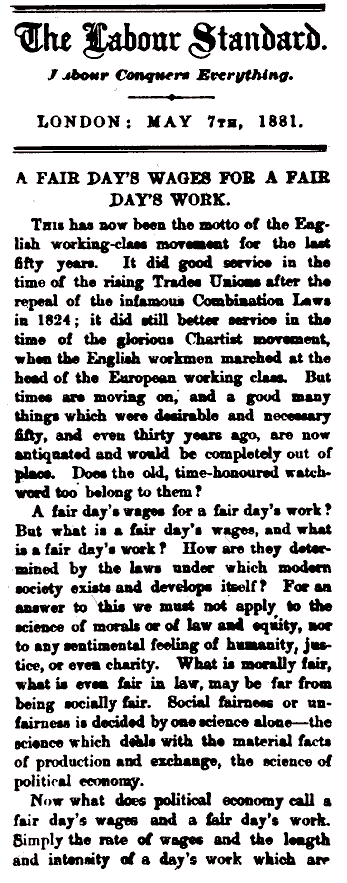Articles by Engels in


As the 1870s drew to a close, the temporary peace between the English classes grew shakey. The Great Depression of the 1870s swept the western world and was, as always, particularly rough on the proletariat. The capitalist cycle downturn set in motion familiar attacks by the capitalist class against what reformist compromises within the capitalist system existed.
George Shipton, Secretary of the London Trades Council, also served as editor of The Labour Standard, the organ of British trade unions. He asked Engels to contribute to a discussion of reformism and the labor movement itself.
Engels complied and, between May and August 1881, wrote 11 articles, all appearing as unsigned editorials. He used contemporary issues to elaborate basic economic principles of scientific socialism and the nature of capitalism itself. Engels stressed the inevitability of the conflict between the capitalists and the proletariat — that struggle isn't an aberration, it's a central feature of capitalism. Capitalists will forever be interested in lowering the wages and living conditions of the masses of property-less people because it's simply in their interest.
He held up trade unions as the daily defenders of the working class in that struggle. In the first article, Engels said the labor movement should lose the meaningless slogan "A Fair Day's Wages for a Fair Day's Work" — since capitalism's internal nature prevents capitalists from being "fair" to the workers whose wages they must continually seek to depress — with the slogan: "Possesion of the means of work — raw material, factories, machinery — by the working people themselves!"
In the article "A Working Men's Party," Engels notes that unions alone cannot break people free from the endless cycle of capitalist wage-slavery. They must congregate in an independent political party. England's lack of such a party kept the working class tailing after the "Great Liberal Party." And that creates confusion and demoralization.
The MECW notes: "These articles by Engels exerted a definite influence on the young generation in the British socialist movement. James Macdonald, later to be one of the representatives of the Marxist wing of the British socialists, said what really attracted him to socialism were Engels' articles in The Labour Standard (How I Became A Socialist, London, 1896, pp. 61-62.)"
From different Engels letters (to Marx, August 11; to George Shipton, August 10 and August 15; to Johann Philipp Becker, February 10 1882) we learn he stopped writing for the paper because of the growth of "opportunist elements" in its editorial board.
Source: The original articles were written in English and the online versions are directly from the newspaper itself.
| To the Working Men of Europe in 1877 | March 3 1878 |
| II | March 10 1878 |
| III | March 17 1878 |
| IV | March 24 1878 |
| V | March 31 1878 |
| A Fair Day's Wages for a Fair Day's Work | May 7 1881 |
| The Wages System | May 21 1881 |
| Trades Unions, part 1 | May 28 1881 |
| Trades Unions, part 2 | June 4 1881 |
| The French Commercial Treaty | June 18 1881 |
| Two Model Town Councils | June 25 1881 |
| American Food and the Land Question | July 2 1881 |
| The Wages Theory of the Anti-Corn Law League | July 9 1881 |
| A Working Men's Party | July 23 1881 |
| Bismarck and the German Working Men's Party | July 23 1881 |
| Cotton and Iron | July 30 1881 |
| Social Classes — Necessary and Superfluous | August 6 1881 |